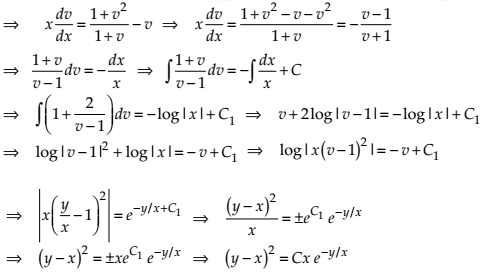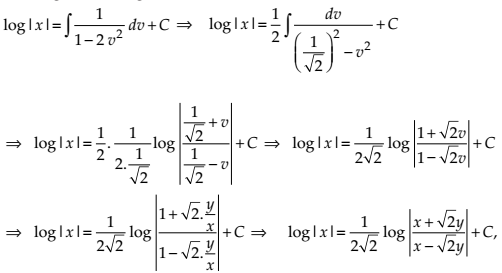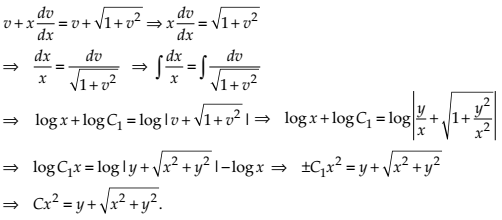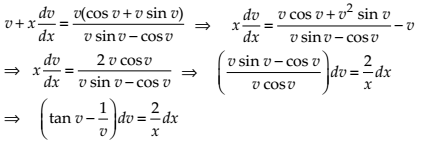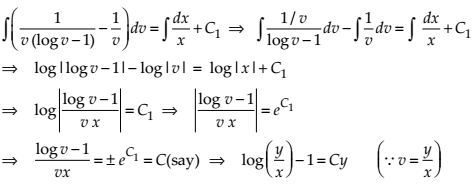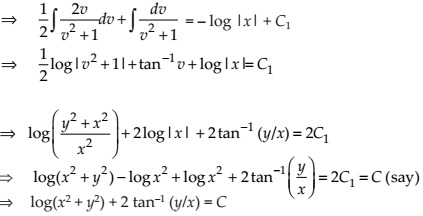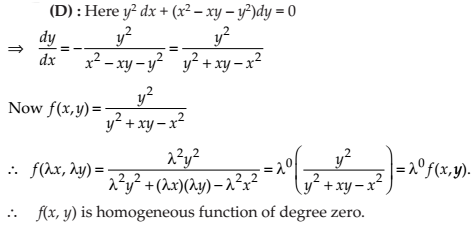Hi Students, Welcome to Amans Maths Blogs (AMB). In this post, you will get the NCERT Solutions for Class 12 Maths Differential Equations Exercise 9.5.
The PDF books of NCERT Solutions for Class 12 are the first step towards the learning and understanding the each sections of Maths, Physics, Chemistry, Biology as it all help in engineering medical entrance exams. To solve it, you just need to click on download links of NCERT solutions for class 12.
CBSE Class 12th is an important school class in your life as you take some serious decision about your career. And out of all subjects, Maths is an important and core subjects. So CBSE NCERT Solutions for Class 12th Maths is major role in your exam preparation as it has detailed chapter wise solutions for all exercise. This NCERT Solutions can be downloaded in PDF file. The downloading link is given at last.
As we know that all the schools affiliated from CBSE follow the NCERT books for all subjects. You can check the CBSE NCERT Syllabus. Thus, NCERT Solutions helps the students to solve the exercise questions as given in NCERT Books.
NCERT Solutions for class 12 is highly recommended by the experienced teacher for students who are going to appear in CBSE Class 12 and JEE Mains and Advanced and NEET level exams. Here You will get NCERT Solutions for Class 12 Maths Differential Equations Exercise 9.5 of all questions given in NCERT textbooks of class 12 in details with step by step process.
NCERT Solutions for Class 12 Maths are not only the solutions of Maths exercise but it builds your foundation of other important subjects. Getting knowledge of depth concept of CBSE Class 12th Maths like Algebra, Calculus, Trigonometry, Coordinate Geometry help you to understand the concept of Physics and Physical Chemistry.
NCERT Solutions for Class 12 Maths Differential Equations
In each of the Exercises 1 to 10, show that the given differential equation is homogeneous and solve each of them.
NCERT Solutions for Class 12 Maths Differential Equations Exercise 9.5: Ques No 1.
(x2 + xy) dy = (x2 + y2) dx
NCERT Solutions:
Given differential equation is

In equation (1), we see that dy/dx is in form of g(y/x), so it is a Homogeneous function of degree zero. Thus, the given differential equation is Homogeneous Differential Equation.
To solve this, we need to put y = vx …(2)
Differentiating the equation (2) with respect to x, we get
On substituting y = vx and in equation (1), we get
where C is an arbitrary constant. This is required general solution of the given differential equation.
NCERT Solutions for Class 12 Maths Differential Equations Exercise 9.5: Ques No 2.
NCERT Solutions:
Given differential equation is
…(1)
In equation (1), we see that dy/dx is in form of g(y/x), so it is a Homogeneous function of degree zero. Thus, the given differential equation is Homogeneous Differential Equation.
To solve this, we need to put y = vx …(2)
Differentiating the equation (2) with respect to x, we get
On substituting y = vx and in equation (1), we get
where C is an arbitrary constant. This is required general solution of the given differential equation.
NCERT Solutions for Class 12 Maths Differential Equations Exercise 9.5: Ques No 3.
(x – y) dy – (x + y) dx = 0
NCERT Solutions:
Given differential equation is
…(1)
In equation (1), we see that dy/dx is in form of g(y/x), so it is a Homogeneous function of degree zero. Thus, the given differential equation is Homogeneous Differential Equation.
To solve this, we need to put y = vx …(2)
Differentiating the equation (2) with respect to x, we get
On substituting y = vx and in equation (1), we get
where C is an arbitrary constant. This is required general solution of the given differential equation.
NCERT Solutions for Class 12 Maths Differential Equations Exercise 9.5: Ques No 4.
(x2 – y2) dx + 2xy dy = 0
NCERT Solutions:
Given differential equation is

In equation (1), we see that dy/dx is in form of g(y/x), so it is a Homogeneous function of degree zero. Thus, the given differential equation is Homogeneous Differential Equation.
To solve this, we need to put y = vx …(2)
Differentiating the equation (2) with respect to x, we get
On substituting y = vx and in equation (1), we get
where C is an arbitrary constant. This is required general solution of the given differential equation.
NCERT Solutions for Class 12 Maths Differential Equations Exercise 9.5: Ques No 5.
NCERT Solutions:
Given differential equation is
…(1)
In equation (1), we see that dy/dx is in form of g(y/x), so it is a Homogeneous function of degree zero. Thus, the given differential equation is Homogeneous Differential Equation.
To solve this, we need to put y = vx …(2)
Differentiating the equation (2) with respect to x, we get
On substituting y = vx and in equation (1), we get
where C is an arbitrary constant. This is required general solution of the given differential equation.
NCERT Solutions for Class 12 Maths Differential Equations Exercise 9.5: Ques No 6.
NCERT Solutions:
Given differential equation is
or

In equation (1), we see that dy/dx is in form of g(y/x), so it is a Homogeneous function of degree zero. Thus, the given differential equation is Homogeneous Differential Equation.
To solve this, we need to put y = vx …(2)
Differentiating the equation (2) with respect to x, we get
On substituting y = vx and in equation (1), we get
where C is an arbitrary constant. This is required general solution of the given differential equation.
NCERT Solutions for Class 12 Maths Differential Equations Exercise 9.5: Ques No 7.
NCERT Solutions:
Given differential equation is

In equation (1), we see that dy/dx is in form of g(y/x), so it is a Homogeneous function of degree zero. Thus, the given differential equation is Homogeneous Differential Equation.
To solve this, we need to put y = vx …(2)
Differentiating the equation (2) with respect to x, we get
On substituting y = vx and in equation (1), we get
Integrating, we get
where C is an arbitrary constant. This is required general solution of the given differential equation.
NCERT Solutions for Class 12 Maths Differential Equations Exercise 9.5: Ques No 8.
NCERT Solutions:
Given differential equation is
…(1)
In equation (1), we see that dy/dx is in form of g(y/x), so it is a Homogeneous function of degree zero. Thus, the given differential equation is Homogeneous Differential Equation.
To solve this, we need to put y = vx …(2)
Differentiating the equation (2) with respect to x, we get
On substituting y = vx and in equation (1), we get
Integrating, we get
where C is an arbitrary constant. This is required general solution of the given differential equation.
NCERT Solutions for Class 12 Maths Differential Equations Exercise 9.5: Ques No 9.
NCERT Solutions:
Given differential equation is

In equation (1), we see that dy/dx is in form of g(y/x), so it is a Homogeneous function of degree zero. Thus, the given differential equation is Homogeneous Differential Equation.
To solve this, we need to put y = vx …(2)
Differentiating the equation (2) with respect to x, we get
On substituting y = vx and in equation (1), we get
Integrating, we get
where C is an arbitrary constant. This is required general solution of the given differential equation.
NCERT Solutions for Class 12 Maths Differential Equations Exercise 9.5: Ques No 10.
NCERT Solutions:
Given differential equation is

In equation (1), we see that dx/dy is in form of g(x/y), so it is a Homogeneous function of degree zero. Thus, the given differential equation is Homogeneous Differential Equation.
To solve this, we need to put x = vy …(2)
Differentiating the equation (2) with respect to y, we get
On substituting x = vy and in equation (1), we get
Integrating, we get
where C is an arbitrary constant. This is required general solution of the given differential equation.
For each of the differential equations in Exercises from 11 to 15, find the particular solution satisfying the given condition:
NCERT Solutions for Class 12 Maths Differential Equations Exercise 9.5: Ques No 11.
(x + y) dy + (x – y) dx = 0; y = 1 when x = 1
NCERT Solutions:
Given differential equation is (x + y) dy + (x – y) dx = 0.

In equation (1), we see that dy/dx is in form of g(y/x), so it is a Homogeneous function of degree zero. Thus, the given differential equation is Homogeneous Differential Equation.
To solve this, we need to put y = vx …(2)
Differentiating the equation (2) with respect to y, we get
On substituting y = vx and in equation (1), we get
Integrating, we get
…(3)
where C is an arbitrary constant. This is required general solution of the given differential equation.
It is given that y = 1 when x = 1.
From the equation (3), we get
Substituting the value of C in equation (3), we get
This is required particular solution of the given differential equation.
NCERT Solutions for Class 12 Maths Differential Equations Exercise 9.5: Ques No 12.
x2 dy + (xy + y2) dx = 0; y = 1 when x = 1
NCERT Solutions:
Given differential equation is x2 dy + (xy + y2) dx = 0.

In equation (1), we see that dy/dx is in form of g(y/x), so it is a Homogeneous function of degree zero. Thus, the given differential equation is Homogeneous Differential Equation.
To solve this, we need to put y = vx …(2)
Differentiating the equation (2) with respect to y, we get
On substituting y = vx and in equation (1), we get
Integrating, we get
…(3)
where C is an arbitrary constant. This is general solution of the given differential equation.
It is given that y = 1 when x = 1.
From the equation (3), we get
Substituting the value of C in equation (3), we get
This is required particular solution of the given differential equation.
NCERT Solutions for Class 12 Maths Differential Equations Exercise 9.5: Ques No 13.

NCERT Solutions:
Given differential equation is

In equation (1), we see that dy/dx is in form of g(y/x), so it is a Homogeneous function of degree zero. Thus, the given differential equation is Homogeneous Differential Equation.
To solve this, we need to put y = vx …(2)
Differentiating the equation (2) with respect to y, we get
On substituting y = vx and in equation (1), we get
Integrating, we get
…(3)
where C is an arbitrary constant. This is general solution of the given differential equation.
It is given that y = π/4 when x = 1.
From the equation (3), we get
Substituting the value of C in equation (3), we get
This is required particular solution of the given differential equation.
NCERT Solutions for Class 12 Maths Differential Equations Exercise 9.5: Ques No 14.

NCERT Solutions:
Given differential equation is

To solve this, we need to put y = vx …(2)
Differentiating the equation (2) with respect to y, we get
On substituting y = vx and in equation (1), we get
Integrating, we get
…(3)
where C is an arbitrary constant. This is general solution of the given differential equation.
It is given that y = 0 when x = 1.
From the equation (3), we get
Substituting the value of C in equation (3), we get
This is required particular solution of the given differential equation.
NCERT Solutions for Class 12 Maths Differential Equations Exercise 9.5: Ques No 15.
y = 2 when x = 1
NCERT Solutions:
Given differential equation is
…(1)
To solve this, we need to put y = vx …(2)
Differentiating the equation (2) with respect to y, we get
On substituting y = vx and in equation (1), we get
Integrating, we get
…(3)
where C is an arbitrary constant. This is general solution of the given differential equation.
It is given that y = 2 when x = 1.
From the equation (3), we get
Substituting the value of C in equation (3), we get
This is required particular solution of the given differential equation.
NCERT Solutions for Class 12 Maths Differential Equations Exercise 9.5: Ques No 16.
A homogeneous differential equation of the from 
(A) y = vx
(B) v = yx
(C) x = vy
(D) x = v
NCERT Solutions:
To solve the homogeneous differential equation of the from 
NCERT Solutions for Class 12 Maths Differential Equations Exercise 9.5: Ques No 17.
Which of the following is a homogeneous differential equation?
(A) (4x + 6y + 5) dy – (3y + 2x + 4) dx = 0
(B) (xy) dx – (x3 + y3) dy = 0
(C) (x3 + 2y2) dx + 2xy dy = 0
(D) y2 dx + (x2 – xy – y2) dy = 0
NCERT Solutions:

